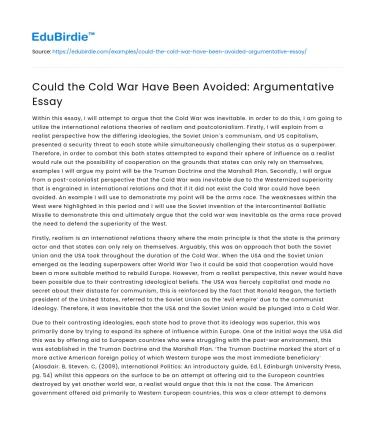Within this essay, I will attempt to argue that the Cold War was inevitable. In order to do this, I am going to utilize the international relations theories of realism and postcolonialism. Firstly, I will explain from a realist perspective how the differing ideologies, the Soviet Union`s communism, and US capitalism, presented a security threat to each state while simultaneously challenging their status as a superpower. Therefore, in order to combat this both states attempted to expand their sphere of influence as a realist would rule out the possibility of cooperation on the grounds that states can only rely on themselves, examples I will argue my point will be the Truman Doctrine and the Marshall Plan. Secondly, I will argue from a post-colonialist perspective that the Cold War was inevitable due to the Westernized superiority that is engrained in international relations and that if it did not exist the Cold War could have been avoided. An example I will use to demonstrate my point will be the arms race. The weaknesses within the West were highlighted in this period and I will use the Soviet invention of the Intercontinental Ballistic Missile to demonstrate this and ultimately argue that the cold war was inevitable as the arms race proved the need to defend the superiority of the West.
Firstly, realism is an international relations theory where the main principle is that the state is the primary actor and that states can only rely on themselves. Arguably, this was an approach that both the Soviet Union and the USA took throughout the duration of the Cold War. When the USA and the Soviet Union emerged as the leading superpowers after World War Two it could be said that cooperation would have been a more suitable method to rebuild Europe. However, from a realist perspective, this never would have been possible due to their contrasting ideological beliefs. The USA was fiercely capitalist and made no secret about their distaste for communism, this is reinforced by the fact that Ronald Reagan, the fortieth president of the United States, referred to the Soviet Union as the ‘evil empire’ due to the communist ideology. Therefore, it was inevitable that the USA and the Soviet Union would be plunged into a Cold War.
Save your time!
We can take care of your essay
- Proper editing and formatting
- Free revision, title page, and bibliography
- Flexible prices and money-back guarantee
Due to their contrasting ideologies, each state had to prove that its ideology was superior, this was primarily done by trying to expand its sphere of influence within Europe. One of the initial ways the USA did this was by offering aid to European countries who were struggling with the post-war environment, this was established in the Truman Doctrine and the Marshall Plan. ‘The Truman Doctrine marked the start of a more active American foreign policy of which Western Europe was the most immediate beneficiary’ (Alasdair. B, Steven. C, (2009), International Politics: An introductory guide, Ed.1, Edinburgh University Press, pg. 54) whilst this appears on the surface to be an attempt at offering aid to the European countries destroyed by yet another world war, a realist would argue that this is not the case. The American government offered aid primarily to Western European countries, this was a clear attempt to demonstrate not only their power but to expand their sphere of influence across Europe and, in turn, protect their country`s main interest that being their security from the spread of communism. This was then expanded upon as ‘A few months later in 1947, US Secretary of State, General George Marshall, outlines a plan to offer economic assistance to aid the recovery of all European states’ (Alasdair. B, Steven. C, (2009), International Politics: An introductory guide, Ed.1, Edinburgh University Press, pg. 54). From a realist perspective it is unconvincing that offering economic aid was done solely to help Europe recover. ‘Among the goals of the Marshall Plan were not only to alleviate post-war Europe`s dire economic condition and reduce the attraction of communism but also to open the door broadly to US commerce’ (Fink. C, (2015), Cold War: an international history, Westview Press as a member of the Perseus Book Group, Colorado) this reflects the realist perspective that everything the US did was to sustain its position as the leading global superpower the Truman Doctrine and the Marshall Plan acted as reminders to the Soviet Union of the power the US had. Therefore, highlighting that within the international relations realist theory, the Cold War was inevitable.
Moreover, another international relations theory that would agree with the statement that the Cold War was inevitable is post-colonialism. The international relations theory of postcolonialism moves away from the Eurocentric view and focuses on what happened as a result of colonialism. Therefore, in relation to the cold war, a post-colonialist would argue that the war could have been avoided if there was not the global view that the West was superior. However, due to the Westernized approach to international relations, the Cold War was inevitable.
A key event within the Cold War that primarily challenged the Western authority of the US, was the arms race. This was when there was a surge in the development of nuclear weapons in both the US and the Soviet Union in an attempt for both states to retain their global superpower status. Initially, the USA was ahead in the arms race due to the development of the atomic bomb and there was no doubt, the soviet`s long-term aim was to become the most powerful state in the world.






 Stuck on your essay?
Stuck on your essay?

